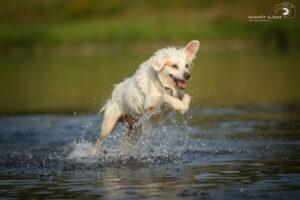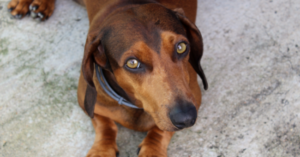Although it may seem like seven years of your dog’s life means nothing to him, this is the time when he starts to show the first signs of ageing. Take your dog for regular walks, train his brain and give him a good diet and supplements to help reduce the signs of ageing.
The symptoms you may observe can be divided into physical and mental. The first physical changes that may occur are digestive problems. The dog may suffer from flatulence or poor digestion. Signs of ageing can be seen with the naked eye, when the dog’s muzzle starts to turn grey or the coat deteriorates and is no longer as shiny as it once was. Also, urine leakage or tartar may occur. Older dogs often gain weight more quickly, which can cause joint problems, and the dog then begins to limp and rest more often.
The senior dog
sleeps much more during the day, is not as socialised, is less interested in walks and finds it harder to learn new things.
But some of the biggest changes take place in the brain. Your dog’s brain is powered by the glucose it gets from its diet. With the turn of the seventh year, the dog begins to lose the ability to use glucose as a source of energy. The dog then becomes less playful, less interested, forgets and loses its youthful sparkle.
Even though your dog may have severe joint problems, deteriorating hearing and eyesight, he still needs your love and care. Stimulate his brain with new games, give him plenty of physical activity, but at a level that he is comfortable with, and visit your vet regularly.
Feed your dog a quality diet and use supplements to improve his quality of life.
Sir Anton’s Secret Vet
cleanses the dog’s system and improves the absorption of nutrients from the diet. It contributes positively to the treatment of overweight and obesity, alleviates psychological problems and improves the overall resistance of the body. Growing old is an integral part of life, but that doesn’t mean it has to be miserable.



